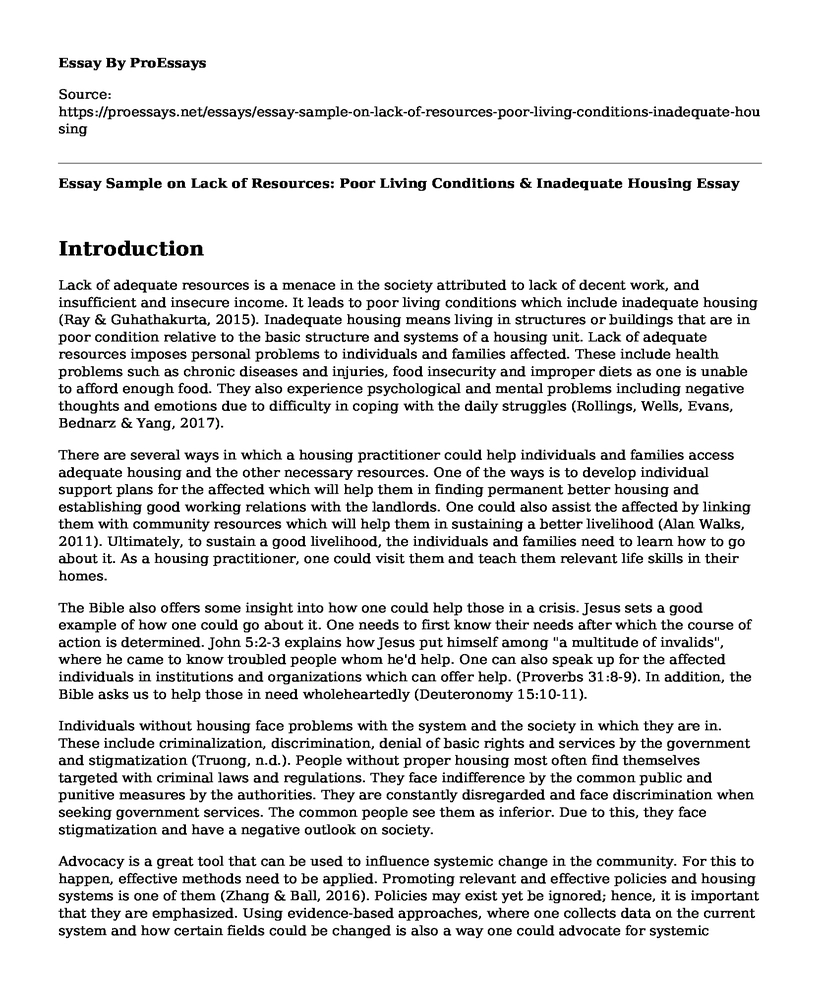Introduction
Lack of adequate resources is a menace in the society attributed to lack of decent work, and insufficient and insecure income. It leads to poor living conditions which include inadequate housing (Ray & Guhathakurta, 2015). Inadequate housing means living in structures or buildings that are in poor condition relative to the basic structure and systems of a housing unit. Lack of adequate resources imposes personal problems to individuals and families affected. These include health problems such as chronic diseases and injuries, food insecurity and improper diets as one is unable to afford enough food. They also experience psychological and mental problems including negative thoughts and emotions due to difficulty in coping with the daily struggles (Rollings, Wells, Evans, Bednarz & Yang, 2017).
There are several ways in which a housing practitioner could help individuals and families access adequate housing and the other necessary resources. One of the ways is to develop individual support plans for the affected which will help them in finding permanent better housing and establishing good working relations with the landlords. One could also assist the affected by linking them with community resources which will help them in sustaining a better livelihood (Alan Walks, 2011). Ultimately, to sustain a good livelihood, the individuals and families need to learn how to go about it. As a housing practitioner, one could visit them and teach them relevant life skills in their homes.
The Bible also offers some insight into how one could help those in a crisis. Jesus sets a good example of how one could go about it. One needs to first know their needs after which the course of action is determined. John 5:2-3 explains how Jesus put himself among "a multitude of invalids", where he came to know troubled people whom he'd help. One can also speak up for the affected individuals in institutions and organizations which can offer help. (Proverbs 31:8-9). In addition, the Bible asks us to help those in need wholeheartedly (Deuteronomy 15:10-11).
Individuals without housing face problems with the system and the society in which they are in. These include criminalization, discrimination, denial of basic rights and services by the government and stigmatization (Truong, n.d.). People without proper housing most often find themselves targeted with criminal laws and regulations. They face indifference by the common public and punitive measures by the authorities. They are constantly disregarded and face discrimination when seeking government services. The common people see them as inferior. Due to this, they face stigmatization and have a negative outlook on society.
Advocacy is a great tool that can be used to influence systemic change in the community. For this to happen, effective methods need to be applied. Promoting relevant and effective policies and housing systems is one of them (Zhang & Ball, 2016). Policies may exist yet be ignored; hence, it is important that they are emphasized. Using evidence-based approaches, where one collects data on the current system and how certain fields could be changed is also a way one could advocate for systemic change. Moreover, one could create programs to help those with inadequate resources, encouraging efforts towards systemic change.
References
Alan Walks, R. (2011). Planning sustainable cities: global report on human settlements 2009 by United Nations Human Settlements Programme. Earthscan/UN-Habitat, London, 2009. No. of pages: xxx + 306. ISBN 978 1 84407 899 8. Population, Space And Place, 17(3), 290-292.
Ray, I., & Guhathakurta, S. (2015). The Impact of Housing Submarkets and Urban Form on the Foreclosure Crisis in U.S. Urban Counties. Housing Policy Debate, 25(3), 549-573. doi: 10.1080/10511482.2014.971043 https://www.tandfonline.com/doi/abs/10.1080/10511482.2014.971043
Rollings, K., Wells, N., Evans, G., Bednarz, A., & Yang, Y. (2017). Housing and neighborhood physical quality: Children's mental health and motivation. Journal Of Environmental Psychology, 50, 17-23. doi: 10.1016/j.jenvp.2017.01.004 https://www.arcc-journal.org/index.php/repository/article/download/534/424/
Thunder Bay Press. (2000). The Holy Bible. San Diego, CA. http://www.thunderbaybooks.com/product/Holy-Bible,448.aspx
Truong, S. "Please do not feed the homeless:" The role of stereotyping and media framing on the criminalization of homelessness. https://escholarship.org/uc/item/9jv4v5nw
Zhang, X., & Ball, M. (2016). Housing the planet: Evolution of global housing policies. Habitat International, 54, 161-165.
Cite this page
Essay Sample on Lack of Resources: Poor Living Conditions & Inadequate Housing. (2023, Jan 14). Retrieved from https://proessays.net/essays/essay-sample-on-lack-of-resources-poor-living-conditions-inadequate-housing
If you are the original author of this essay and no longer wish to have it published on the ProEssays website, please click below to request its removal:
- Essay Example: Refugees Freedom of Movement as a Human Right
- Interview Questions on the Influence of Video Games on Different Cultures
- The Success of the "Computer" Women - Essay Sample
- Poverty Among Children in Uganda: Annotated Bibliography
- Animal Bushmeat and Ethics Essay
- Strategic Planning for Health Program for Obese Children in Claiborne County
- Underage Drinking: Parents Partly to Blame - Essay Sample







